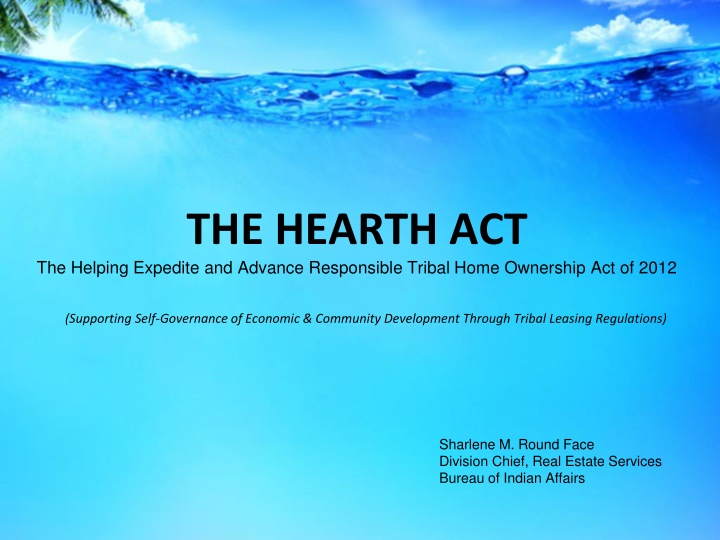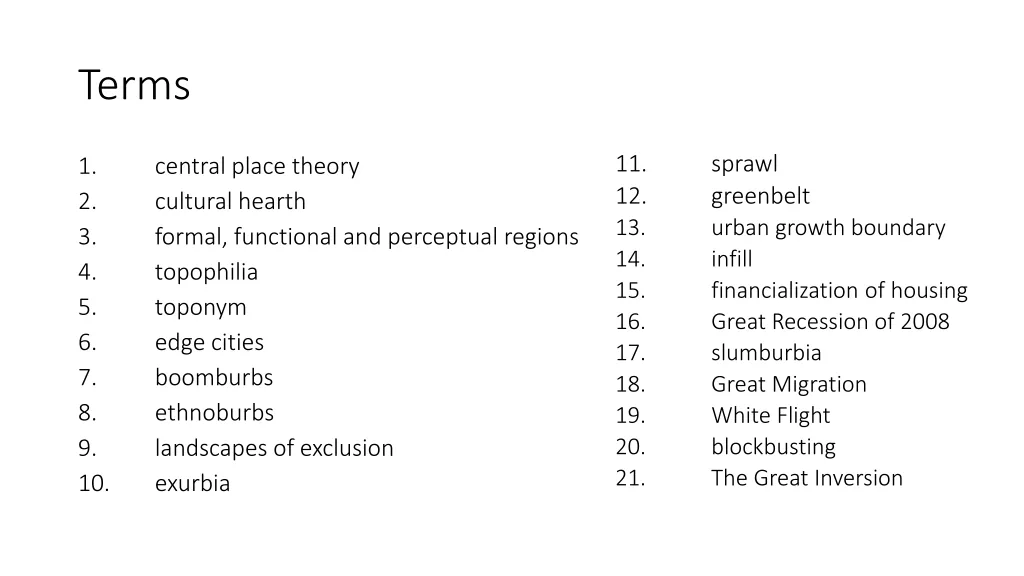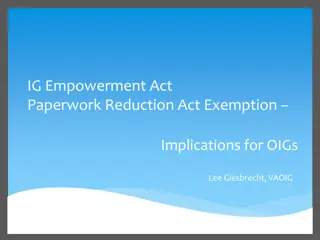THE HEARTH ACT
The HEARTH Act of 2012 empowers Federally-Recognized Tribes to manage leases of their trust lands independently, fostering economic growth and community development. Learn how this Act benefits tribes and opens up opportunities for job creation and service provision through various leasing ventures. Considerations for tribal implementation are also explored to maximize the Act's potential impact.
Download Presentation

Please find below an Image/Link to download the presentation.
The content on the website is provided AS IS for your information and personal use only. It may not be sold, licensed, or shared on other websites without obtaining consent from the author.If you encounter any issues during the download, it is possible that the publisher has removed the file from their server.
You are allowed to download the files provided on this website for personal or commercial use, subject to the condition that they are used lawfully. All files are the property of their respective owners.
The content on the website is provided AS IS for your information and personal use only. It may not be sold, licensed, or shared on other websites without obtaining consent from the author.
E N D
Presentation Transcript
THE HEARTH ACT The Helping Expedite and Advance Responsible Tribal Home Ownership Act of 2012 (Supporting Self-Governance of Economic & Community Development Through Tribal Leasing Regulations) Sharlene M. Round Face Division Chief, Real Estate Services Bureau of Indian Affairs
WHAT DOES THE HEARTH ACT DO? Amends the Indian Long-Term Leasing Act of 1955, to include Tribal Approval of Leases (25 U.S.C. 415(h). Provides a process for Federally-Recognized Tribes to approve and manage leases of their tribal trust and restricted lands without: - - review of tribal leases by the Bureau of Indian Affairs or approval of tribal leases by the Secretary of the Interior. Tribes may negotiate, approve, manage, and enforce leases of their trust and restricted lands under tribal leasing regulations if: - the tribe s leasing regulations have been reviewed by the BIA and approved by the Secretary of the Interior prior to execution of the lease. -
HOW CAN THE HEARTH ACT BENEFIT TRIBES? Economic & Community Development Tribes can offer a streamlined leasing process. May significantly reduce the time to execute and approve leases. Timely execution of leases can encourage potential lessees to invest and develop in tribal communities. Tribes may enact leasing regulations only for specific areas. Enables a tribe to concentrate on those areas that will be of the greatest benefit, or address the greatest need, in the tribal community (i.e., housing). Other areas of leasing (i.e., business or agricultural) may remain subject to BIA review and Secretarial approval under 25 CFR Part 162. Tribes can assume responsibility for other areas of leasing at a later time by submitting additional regulations under the HEARTH Act process. Recognition of Traditional and Cultural Practices. Tribal regulations can include provisions that address modern-day leasing issues consistent with tribal practices. Handling dispute resolution, trespass, land use for religious purposes, etc.
LEASES OF TRIBAL TRUST LANDS THAT CAN BENEFIT TRIBES Some of the Leasing Opportunities That Can Provide Jobs and Services to the Tribal Community: Medical Centers Housing Commercial Centers Community Centers Hotels & Resorts Wind and Solar Development Banks Agricultural Development Day-Care Centers
Additional Considerations Each tribe should assess its own needs to determine if self-regulation of leasing activities under the HEARTH Act will benefit the tribe. Funding Tribal concerns about costs associated with undertaking the full administration and management of leasing. Tribal concerns that existing funds may be diminished if they assume the leasing function. Technical Support Tribes may request, and the Secretary may provide, technical support for development of a environmental review process. Lease Enforcement (Violations/Cancellation) Upon reasonable notice from the tribe, the Secretary may enforce provisions of or cancel a lease.
THE 3-STEP REVIEW AND APPROVAL PROCESS STEP 1 STEP 2 STEP 3 Tribe BIA Secretary The tribe drafts, approves, and submits leasing regulations to BIA s Central Office Review by Division of Real Estate Services, Regional/Agency Offices (discretionary), and Solicitor s Office Final Review within offices of the Assistant Secretary Indian Affairs and Secretarial approval
STEP 1: TRIBE SUBMITS LEASING REGULATIONS Tribes submit their leasing regulations to the Deputy for Trust Services, BIA Helen Riggs Deputy Bureau Director - Trust Services Bureau of Indian Affairs 1849 C Street NW (MS-4642-MIB) Washington, DC 20240 To facilitate the BIA s review process, concurrently email PDF and Word versions of the submission to: Cynthia Morales, Realty Specialist, HEARTH Act Coordinator and Liaison, cynthia.morales@bia.gov.
STEP 2: BIA REVIEW PROCESS Concurrent review by BIA and Solicitors. Consistency with 25 CFR Part 162 Regulations. Subpart B: Agricultural Leases Subpart C: Residential Leases Subpart D: Business Leases Subpart E: Wind and Solar Resource Leases May only apply to tribal trust & restricted lands. No leases for the exploration, development, or extraction of any mineral resources.
STEP 2: BIA REVIEW PROCESS Regulations cannot exceed authorized lease terms: Business or Agricultural Leases - - - 25-year term + 2 options for additional terms. Additional terms cannot exceed 25 years each. Total maximum lease term of 75 years. Residential, Public, Religious, Educational, or Recreational Leases - 75-year term.
STEP 2: BIA REVIEW PROCESS Regulations must contain an environmental review process for proposed leases that: Identifies & evaluates significant effects of the proposed lease on the environment. Provides a period for public notice and comments on significant impacts to environment. - The tribe can define the terms environment, significant effects, and public as it deems appropriate. Provides a tribal response to relevant & substantive public comments prior to lease approval.
STEP 2: BIA REVIEW PROCESS Regulations may address leasehold mortgages. Tribe has authority to approve leasehold mortgages, BIA approval is not required. Mortgages of tribal lands are not allowed.
STEP 3: SECRETARIAL APPROVAL BIA forwards regulations to the Office of the Assistant Secretary-Indian Affairs (AS-IA). After final review, the Assistant Secretary- Indian Affairs approves the regulations. Tribes are notified of approved regulations. Publication of a Federal Register Notice that the tribal regulations have been approved, and including a statement regarding taxation.
SECRETARIAL APPROVAL With approval of the tribe s leasing regulations, no further BIA reviews or Secretarial approvals are necessary for leases executed under those tribal regulations.
Approved & Pending Tribal Leasing Regulations 27 Tribal Leasing Regulations have been approved for 24 tribes, as of April 7, 2016. 14 Regulations are currently within the review and approval process.
Approved Tribal Leasing Regulations 27 Approved Tribal Leasing Regulations (24 tribes) Federated Indians of Graton Rancheria (Business) Cowlitz Indian Tribe (Business) Pueblo of Sandia (Business) Oneida Indian Nation (Business) Pokagon Band of Potawatomi Indians (Residential) Ho-Chunk Nation (Separate: Business, Residential & Agricultural Ordinances) Ak-Chin Indian Community (Business) Absentee Shawnee Tribe of Oklahoma (Business) Santa Rosa Band of Cahuilla Indians (Business) Rincon Band of Luiseno Indians (Business) Citizen Potawatomi Nation (Business) Makah Indian Tribe (Business\Residential) Ewiiaapaayp Band of Kumeyaay Indians (Business) Squaxin Island Tribe (Business) Kaw Nation (Business) Gila River Indian Community (Business/Solar) Jamestown S'Klallam Tribe (Business) Ohkay Owingeh (Business/Agricultural/Residential/Wind & Solar) Dry Creek Rancheria Band of Pomo Indians (Business) Shakopee Mdewakanton Sioux Community (Business) Wichita and Affiliated Tribes (Business) Mohegan Tribe of Indians of Connecticut (Business) Agua Caliente Band of Cahuilla Indians (Business) Seminole Tribe of Florida (Separate: Business & Residential Ordinances)
HEARTH Act Points of Contact Sharlene M. Round Face Division Chief, Real Estate Services 1849 C Street, NW, MS 4642-MIB Washington, D.C. 20240 Phone: (202) 208-3615 E-mail: sharlene.roundface@bia.gov Cynthia Morales Realty Specialist, HEARTH Act Coordinator & Liaison Phone:(202) 768-4166 E-mail: cynthia.morales@bia.gov
HEARTH ACT INFORMATION ON THE INDIAN AFFAIRS WEBSITE Please visit our web site for additional information on the HEARTH Act process: http://www.bia.gov/WhoWeAre/BIA/OTS/HEARTH/index.htm
THANK YOU! THANK YOU!























